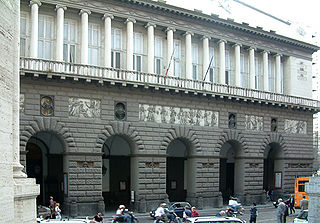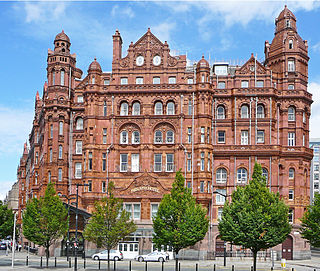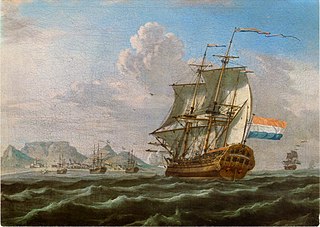
Warsaw is the capital and largest city of Poland. The metropolis stands on the Vistula River in east-central Poland and its population is officially estimated at 1.8 million residents within a greater metropolitan area of 3.1 million residents, which makes Warsaw the 7th most-populous capital city in the European Union. The city limits cover 517.24 square kilometres (199.71 sq mi), while the metropolitan area covers 6,100.43 square kilometres (2,355.39 sq mi). Warsaw is an alpha global city, a major international tourist destination, and a significant cultural, political and economic hub. Its historical Old Town was designated a UNESCO World Heritage Site.

Palace of Culture and Science, is a notable high-rise building in central Warsaw, Poland. With a total height of 237 metres (778 ft) it is the tallest building in Poland, the 5th-tallest building in the European Union and one of the tallest on the European continent. Constructed in 1955, it houses various public and cultural institutions such as cinemas, theatres, libraries, sports clubs, university faculties and authorities of the Polish Academy of Sciences. Since 2007 it has been enlisted in the Registry of Objects of Cultural Heritage.

An opera house is a theatre building used for performances of opera. It usually includes a stage, an orchestra pit, audience seating, and backstage facilities for costumes and building sets.

Victorian architecture is a series of architectural revival styles in the mid-to-late 19th century. Victorian refers to the reign of Queen Victoria (1837–1901), called the Victorian era, during which period the styles known as Victorian were used in construction. However, many elements of what is typically termed "Victorian" architecture did not become popular until later in Victoria's reign. The styles often included interpretations and eclectic revivals of historic styles. The name represents the British and French custom of naming architectural styles for a reigning monarch. Within this naming and classification scheme, it followed Georgian architecture and later Regency architecture, and was succeeded by Edwardian architecture.

A convention center is a large building that is designed to hold a convention, where individuals and groups gather to promote and share common interests. Convention centers typically offer sufficient floor area to accommodate several thousand attendees. Very large venues, suitable for major trade shows, are sometimes known as exhibition centres. Convention centers typically have at least one auditorium and may also contain concert halls, lecture halls, meeting rooms, and conference rooms. Some large resort area hotels include a convention center. Jumeirah Beach Hotel and Conference Centre, Dubai and Covention and Events Centre, Estel Hotel, Berlin, are two of the most impressive convention hotels.

The Auditorium Building in Chicago is one of the best-known designs of Louis Sullivan and Dankmar Adler. Completed in 1889, the building is located at the northwest corner of South Michigan Avenue and Congress Street. The building, which when constructed was the largest in the United States and the tallest in Chicago, was designed to be a multi-use complex, including offices, a theater, and a hotel. As a young apprentice, Frank Lloyd Wright worked on some of the interior design.

Congress Hall is a historic hotel in Cape May, Cape May County, New Jersey, United States, occupying a city block bordered on the south by Beach Avenue and on the east by Washington Street Mall. It is a contributing building in the Cape May National Historic District.

The Midland Hotel Manchester, often referred to simply as The Midland, is a grand hotel in Manchester, England. Opened in September 1903, it was built by the Midland Railway to serve Manchester Central railway station, its northern terminus for its rail services to London St Pancras. It faces onto St Peter's Square. The hotel was designed by Charles Trubshaw in a highly individualistic Edwardian Baroque style. It is a Grade II* listed building.

Pola Negri was a Polish stage and film actress and singer who achieved worldwide fame during the silent and golden eras of Hollywood and European film for her tragedienne and femme fatale roles and was acknowledged as a sex symbol.

Jan Wiktor Kiepura was a Polish singer (tenor) and actor.
The ideas of the Age of Enlightenment in Poland were developed later than in Western Europe, as the Polish bourgeoisie was weaker, and szlachta (nobility) culture (Sarmatism) together with the Polish-Lithuanian Commonwealth political system were in deep crisis. The period of Polish Enlightenment began in the 1730s–40s, peaked in the reign of Poland's last king, Stanisław August Poniatowski, went into decline with the Third Partition of Poland (1795) – a national tragedy inspiring a short period of sentimental writing – and ended in 1822, replaced by Romanticism.

Neoclassical architecture in Poland was centered on Warsaw under the reign of Stanisław August Poniatowski, while the modern concept of a single capital city was to some extent inapplicable in the decentralized Polish–Lithuanian Commonwealth. Classicism came to Poland in the 18th century as the result of French infiltrations into the Polish millieu. The best-known architects and artists who worked in Poland were Dominik Merlini, Jan Chrystian Kamsetzer, Szymon Bogumił Zug, Stanisław Zawadzki, Efraim Szreger, Antonio Corazzi, Jakub Kubicki, Hilary Szpilowski, Christian Piotr Aigner, Wawrzyniec Gucewicz, Bonifacy Witkowski and Danish Bertel Thorvaldsen.
Thomas Hurst Hughes was a U.S. Representative from New Jersey; born in the Cold Spring section of Lower Township, Cape May County, New Jersey, January 10, 1769; attended the public schools; moved to Cape May City in 1800 and engaged in the mercantile business; in 1816 he built Congress Hall, a hotel which he conducted for many summer seasons; sheriff of Cape May County 1801–1804; member of the New Jersey General Assembly from 1805 to 1807, 1809, 1812, and 1813, and a member of the New Jersey Legislative Council from 1819 to 1823 and in 1824 and 1825; elected as an Anti-Jacksonian candidate to the Twenty-first and Twenty-second Congresses, serving in office from March 4, 1829 to March 3, 1833); was not a candidate for renomination in 1832; resumed the hotel business; died in Cold Spring, N.J., November 10, 1839; interment in Cold Spring Presbyterian Cemetery.

The Cape May Historic District is an area of 380 acres (1.5 km2) with over 600 buildings in the resort town of Cape May, Cape May County, New Jersey. The city claims to be America's first seaside resort and has numerous buildings in the Late Victorian style, including the Eclectic, Stick, and Shingle styles, as well as the later Bungalow style, many with gingerbread trim. According to National Park Service architectural historian Carolyn Pitts, "Cape May has one of the largest collections of late 19th century frame buildings left in the United States... that give it a homogeneous architectural character, a kind of textbook of vernacular American building."

A landmark is a recognizable natural or artificial feature used for navigation, a feature that stands out from its near environment and is often visible from long distances.

The Congress Hall is a 2,880 seat theatre at the Palace of Culture and Science in Warsaw, Poland. It was opened in 1955 as the location of Polish United Workers' Party congresses.

Stephen Decatur Button was an American architect and a pioneer in the use of metal-frame construction for masonry buildings. He designed commercial buildings, schools and churches in Philadelphia, Pennsylvania, and Camden, New Jersey; and more than 30 buildings in Cape May, New Jersey.

The Congress Hall is the Government House in Ufa, built for the 450th anniversary of the accession of Bashkortostan to Russia.

The April 25 House of Culture is a theatre located in Pyongyang, North Korea. It was built in 1974-1975 to provide a venue for military education, and was originally called the February 8 House of Culture. It is located on Pipha Street in the Moranbong District of Pyongyang. The classically colonnaded building is considered one of the best examples of 1970s socialist monumentality in Pyongyang, and hence in Korea, the other being the visually similar Mansudae Art Theatre.
















